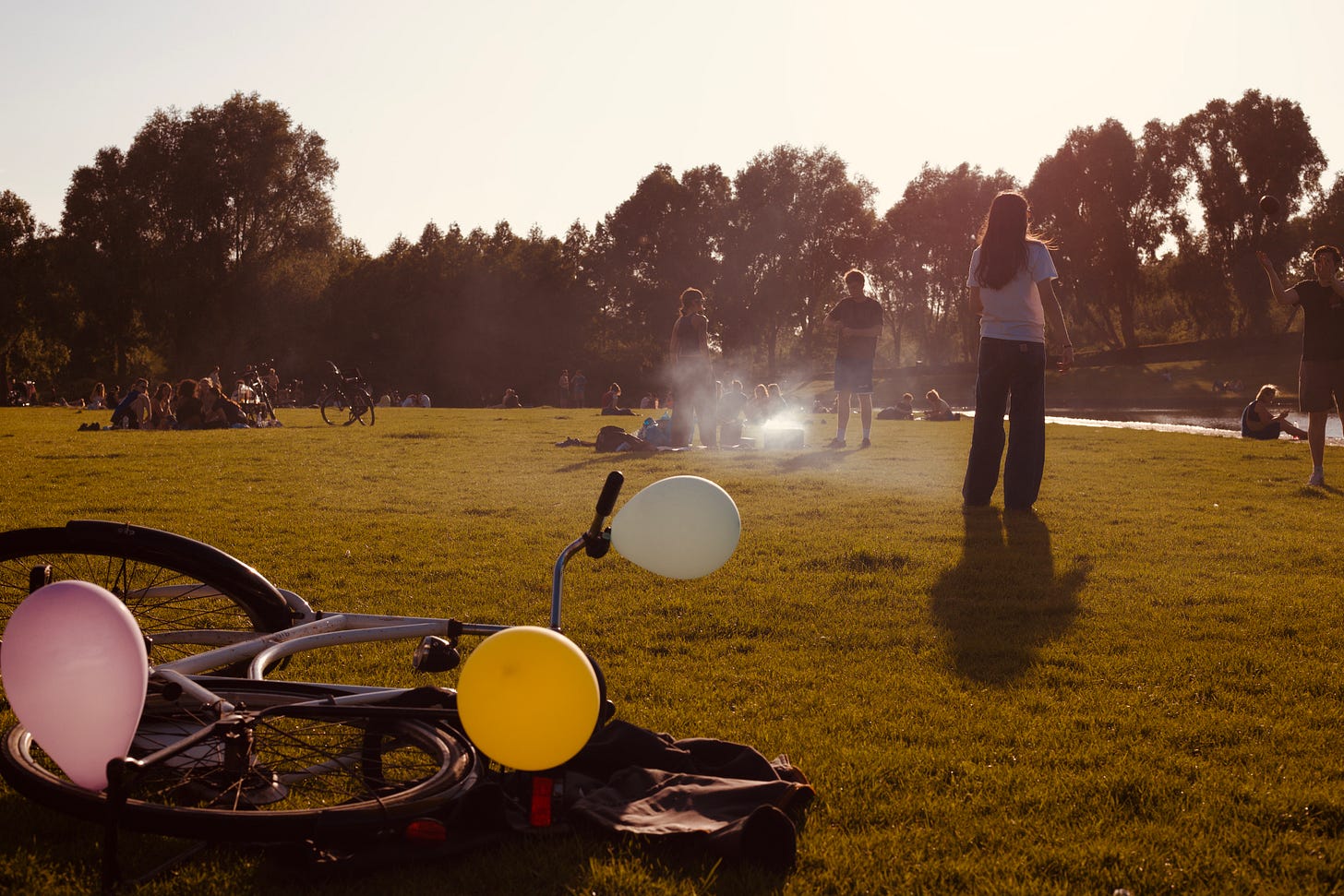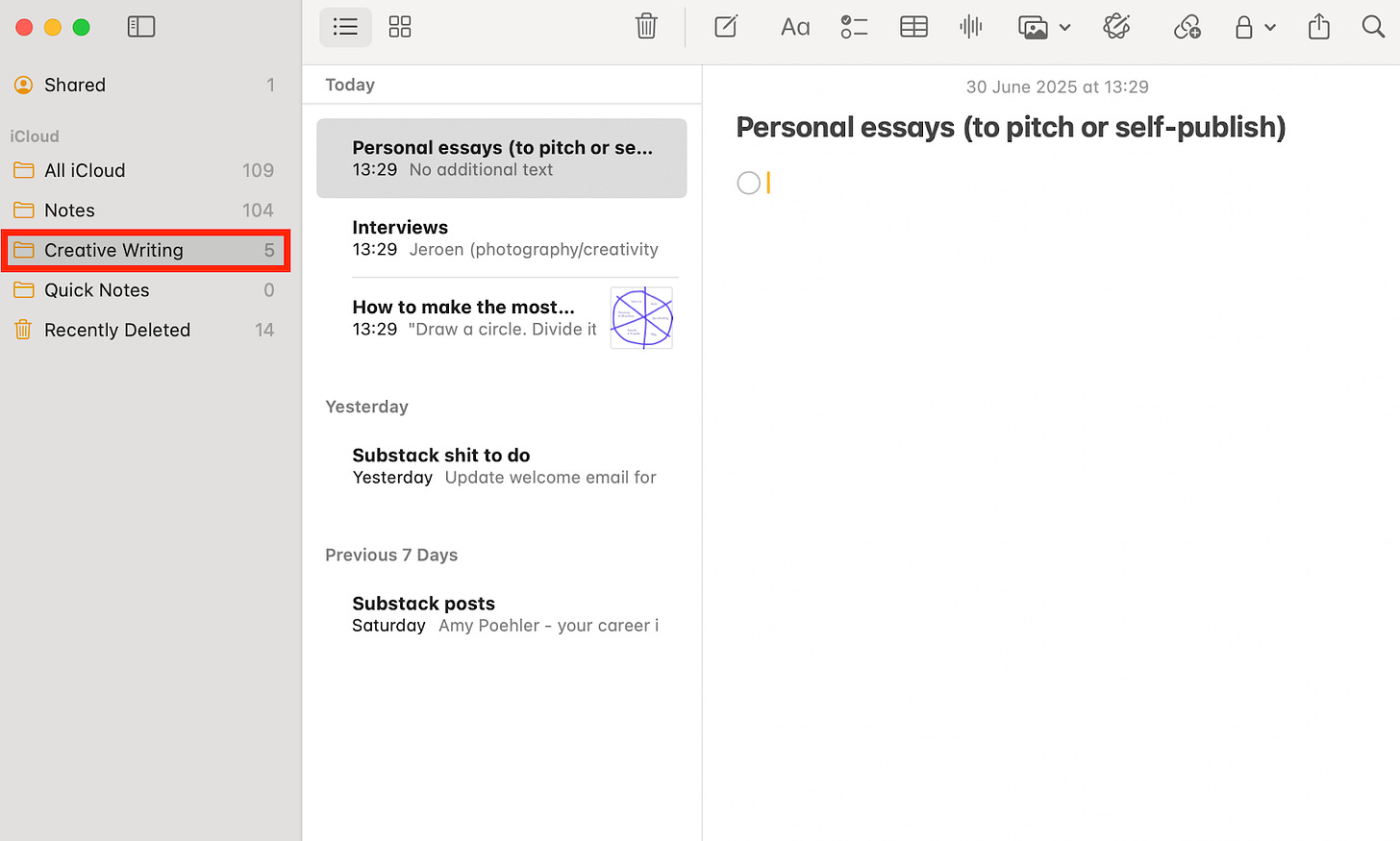How can I better manage my writing time and ideas, and step away to give my brain a rest?
Welcome to Issue #2 of Ask Alexis.
Hello! Welcome to issue #2 of Ask Alexis—a new monthly Q&A column where I answer your questions in detail. Whether you're looking for real advice, a new perspective, or an absurd answer to a silly question, nothing is off limits here! Ask me about living abroad, writing, having a younger boyfriend lol, etc. Submit your questions here (it takes about 1 minute and 12 seconds). Let’s have some fun! Note: You must be a newsletter subscriber to pick my brain. It’s 100% free! (For now.)
Ask Alexis - Issue #2
“I'd like to know how to become a more successful writer. By "successful," I mean one who can better manage my writing time, keep notes and resources from taking over the house, learn how to step away and stretch when I'm in the flow, and give my brain a rest when I'm so excited and just want to write all day. All writing "management" tips are appreciated!”
— from The Periprofessional
I think most writers can probably agree that there’s no right or wrong way to manage your time, ideas, and rest, but that it’s important to create systems that work for you, and also to cut yourself some slack when you go off track.
Sometimes you need to pivot and try new ways of working, and sometimes stepping away for a few days or weeks to refill your cup leads to more creativity. I’m great with staying organized when it comes to client work for my freelance content marketing and writing biz, but I’m usually all over the place when it comes to my Substack, so I appreciate this question as it has made me think about how I can avoid burning the candle at both ends with my creative and personal writing.
Here are my top tips on organization, time management, and creative rest:
Creating and organizing an idea bank
I’ve jumped between different organizational methods for the random ideas that keep me up at 3 am. Initially, I was storing them in Notion, but recently I switched to the Notes app because it’s the easiest place to access quickly from all my devices (this is assuming you’re an Apple user). I created a folder called “Creative Writing,” which works in my case because that’s what I’m using Substack for, but name it whatever works best for you! I’ve also considered calling it “Sit Your Ass Down And Write”.
Within that folder, I have the following Notes:
Substack shit to do. A simple to-do list of the admin-related things I want/need to do for my publication, like update my welcome email, etc.
Substack posts. This one is exactly what it says—a list of topics to write about. But, to be honest, I always question whether it’s worth creating these lists or not, because usually what happens is I generate a massive list and then never write about the topics. For my personal/creative writing, I’m kind of flying by the seat of my pants and seeing where the wind blows me. I realize this isn’t super helpful. For client work, I always plan topics and keep an editorial calendar with monthly themes and topics in Notion or Google Sheets.
Personal essays (to pitch or self-publish). A quick place to jot down essay ideas. I have a database in Notion where I keep track of all the personal essays I’ve pitched, including editor contact information, date pitched, status, and links to pitch instructions for future reference.
Interviews. This is where I’m building a list of fellow Substackers and other interesting humans that I’d love to invite to participate in a written Q&A interview.
Within my Creative Writing folder, I also have a Note that consists of bullets for a new piece I’m working on about turning 40 and reflecting on everything I wish I knew in my 20s and 30s. Once I’ve fleshed out the idea more, I’ll move it to a Google Doc for drafting. I like that I can easily pop into the Note between now and September (my birthday month), to add to the list.
Managing writing time
My top tip here is to set daily “writing blocks” for yourself and add them to your calendar. I do this with client work, but I want to eventually get into this habit with my creative writing, too.
Having time blocked off in your calendar can help you stay disciplined and hold yourself accountable. It’s like a meeting scheduled with yourself that you can’t, in theory, flake on. The length of the writing blocks is up to you. I usually schedule two to four hours, depending on what I’ve got on. You might choose to schedule your writing blocks at the same time every day or work them around whatever else is on your schedule. I know some people prefer to sit down to write at the same time every day, but anytime works for me as long as it’s sometime before 2 pm. By 3 pm, my brain shuts down, and deep work and writing are out of the question. The afternoon is usually when I do reviews or edits or stare out the window.
Taking creative rest
I love that you asked about how to give your brain a rest because it’s something I struggle with A LOT. So this next part is a reminder for me, too.
I’m constantly battling with myself because I believe I need creative rest, but I also really enjoy writing and doing other creative things like photography, drawing, painting, etc.
I also love brainstorming and generating new ideas, which is something I’m slowly learning to tame. Not every new idea has to be treated like a shiny new object that I must have or chase after.
I add “creative rest” breaks to my calendar as a gentle reminder to get up, stretch, go for a walk, or take a few days off. Whether I follow them is another story, but baby steps, right?
At least once a month, I feel scatterbrained and like I’m overflowing with ideas. Sometimes I toss and turn all night, but what I find helps is getting up, stumbling into the living room, and jotting things down long-hand in my notebook. When my tank is 100% empty, I go back to bed. I usually still wake up feeling like my head was squished between two bookends, but it reduces the amount of time I lie awake with a tornado of ideas storming through my head.
If I don’t feel like getting up, sometimes I read a few pages on my Kindle of whatever book I’m currently enjoying (just finished Is Everyone Hanging Out Without Me? by Mindy Kaling and highly recommend it). Reading helps me redirect my thoughts and doze off.
I think it’s important to find a balance between input and output. If I’m constantly writing and neglecting my reading habits (or never leaving my apartment), for example, I begin to feel like I’m trying to pour from an empty cup.
So, to recap
Create a system for storing ideas and early drafts. I know this is a bit broad, but this is something you need to set up in a way that works best for you. I’ve shared what works for me above, but you might have a different way of working/organizing.
Add writing blocks to your calendar and stick to them.
Schedule creative rest in your calendar.
Do regular, long-hand brain dumps (morning pages can help with this, too!).
Before you chase after a new idea, ask yourself if it’s truly important or worthwhile.
Bonus: I currently have the following questions on my whiteboard, so I’m reminded of them daily:
Am I doing this because I want to or because I think I should?
What are you doing? Why are you doing it? Where will accomplishing it take you? Don’t have a good answer? STOP. (I read this in a book, but now I can’t recall which one.)
I think you can apply the same theories to your writing practice. Sometimes I feel like I should always be writing and producing, but I’m tired and the quality is shit. I’m forcing it. I’m doing it because I think it’s what I’m supposed to be doing, versus because it’s what I want to be doing at that moment. I know many resources say to write even when you don’t feel inspired, and create a daily practice. I agree with that, but I also feel like a lot of writing happens when you’re away from the keyboard and out there living your life. At least that’s what I’ve noticed.
Before I wrap up, I just discovered a podcast called Essential Guide to Writing a Novel, which, as the title suggests, is mainly applicable to writing a novel, but episode 171 is a top ten list of bad advice for writers. Many of the principles apply to all types of writing (at least I think so). Here it is in case you want to have a listen.
Shelby, I hope I have sufficiently answered your questions!
Comments
Readers, if you have something to add (I’m sure you do!) or if you have related questions, feel free to drop them in the comments of this post, and I’ll do my best to answer them!
Thanks for reading, and see you soon!
Alexis
P.S. Don’t forget to submit your questions here for my Ask Alexis column. I’d love the chance to answer a few funny or absurd ones (you can remain anonymous). Dad, your questions are welcome too.





great tips! it's so hard finding a rhythm and organisation way to make this easier so i'm going to try these. i'm all about finding the easiest way
It’s nice that you have a broader range of creative activities that excite you. I feel like I put all my focus Ava energy into writing these days. Do you feel like the other stuff inspires you in other areas? Like after working in visual art, do you feel more energized to write?